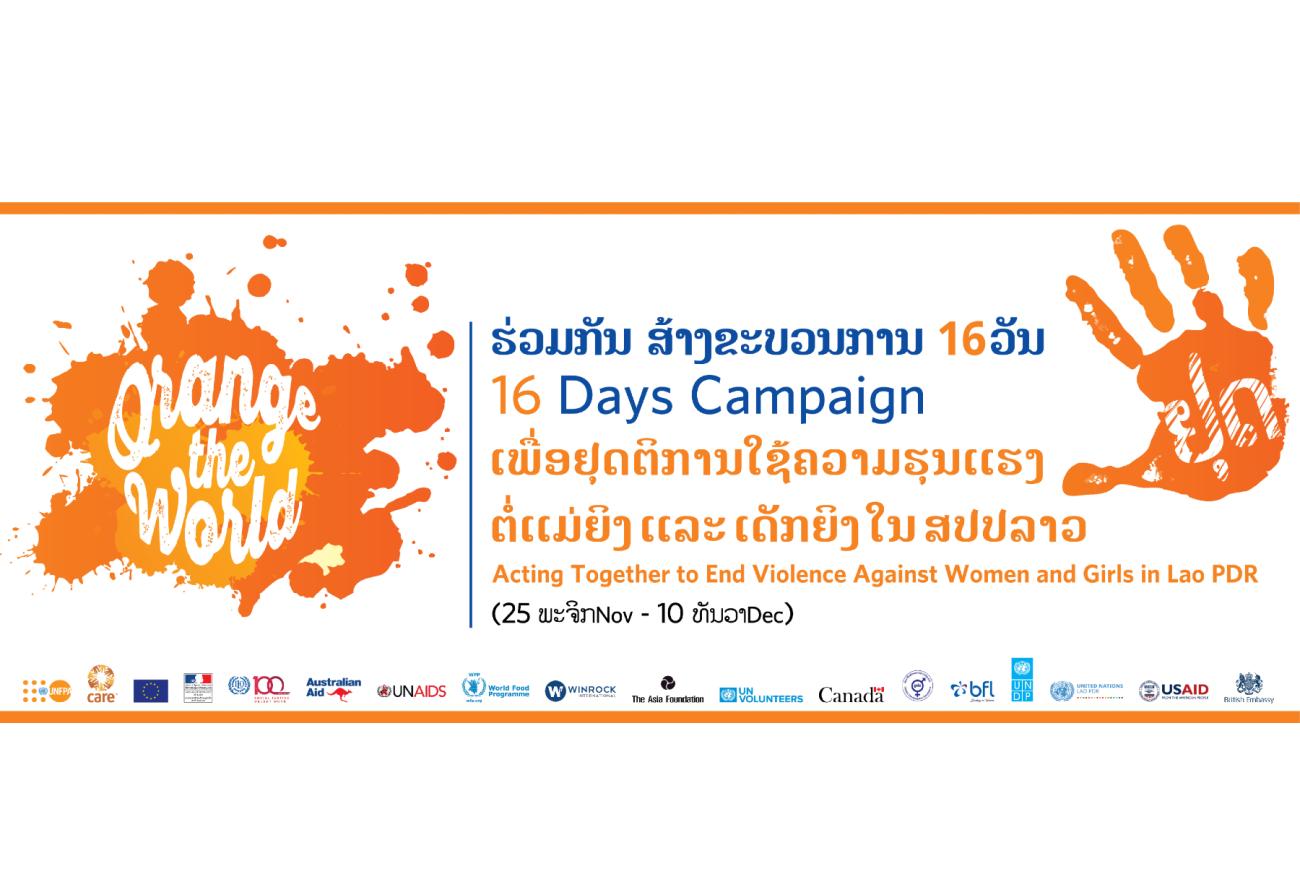The 16 Days campaign in Lao PDR is part of the annual international campaign on gender-based violence running from the International Day for Elimination of Violence against Women to the Human Rights Day.
At the recently concluded Nairobi Summit on ICPD25, the government of Lao PDR has pledged strong commitments on accelerating unfinished businesses on ICPD forward, which included specific targets on promoting gender equality - namely, to end gender-based violence and harmful practices such as early marriage by 2030, and to finalize and implement policies and laws on gender.
Under the coordination of the United Nations Population Fund (UNFPA), over 20 partners joined hands together to promote public awareness on violence against women, including UN agencies, international NGOs, donor governments, private sector, media and civil society organizations.
This year’s 16 Days Campaign rallied new and existing partners to join a social media relay passing on messages highlighting localized actions to address gender-based violence in Lao PDR. The UN Country Team in Lao PDR (the UN Resident Coordinator’s Office, UN Development Program, UN Volunteers, International Labour Organization, Joint United Nations Programme on HIV/AIDS, World Food Programme), the donor community (European Union, United States Agency for International Development, the Canadian Embassy, the British Embassy, the Australian Embassy, the French Embassy), international and national NGOs (the Asia Foundation, Care International, Winrock), and private sector partner BFL (Banque Franco Lao) participated in the campaign. The concerted efforts of the partners have reached out to over 500,000 people in Laos on social media.
The first national survey on gender-based violence, released in 2016, revealed that one in three Lao women in a relationship had experienced physical, sexual or emotional violence at the hands of their partner. Yet, the survey showed that more than 70 per cent of survivors never seek help from anyone, while 19 per cent sought help from a community leader. Only 4 per cent went to the police and only 3 per cent sought assistance from health services.
In the Lao context, as elsewhere, traditional social norms are the underlying causes for gender discriminatory practices, including violence against women and girls. Care International promoted “Brave to Change”, a new soap opera in collaboration with the Lao Women’s Union focusing on healthy relationships and gender equality. The series show that positive norm changes can take place in daily life, such as household workload sharing, joint household decision making, women’s voice and participation in public decision-making.
A number of agencies sent strong messages to advocate for male involvement in the fight against gender-based violence. Ambassadors of EU and France recorded a video message calling for men and boys to act as advocates for ending violence against women.
UNFPA highlighted the importance of engaging young people, both boys and girls, in promoting positive gender norms as the change agents in the society. In addition to the campaign, UNFPA reached widely to the Lao public through a special interview with the China Radio International Lao Branch (CRI Lao).
During the 16 Days Campaign, national media covered the endeavors on gender-based violence extensively. Through the story of a woman living in the shadow of violence from her husband, the coverage of the women and girls’ pathway to a life free from violence in Laos presented a call for action to enhance prevention and response to gender-based violence.
“Campaigns like this one not only raise awareness, but also highlight local solutions from all partners to address the root causes of gender discrimination from different dimensions,” said Mariam Khan, UNFPA Representative in Laos.
She called upon continued efforts to campaign on ending gender-based violence during the 16 Days, which has served as a collective platform for joint actions.
UNFPA, together with other partners, will continue to support the Lao Women’s Union to adopt the Essential Services Package for Women and Girls Subject to Violence (ESP) in line with the national context, a set of global practical tools and guidelines to develop effective multi-sectoral mechanisms to prevent and respond to gender-based violence.



